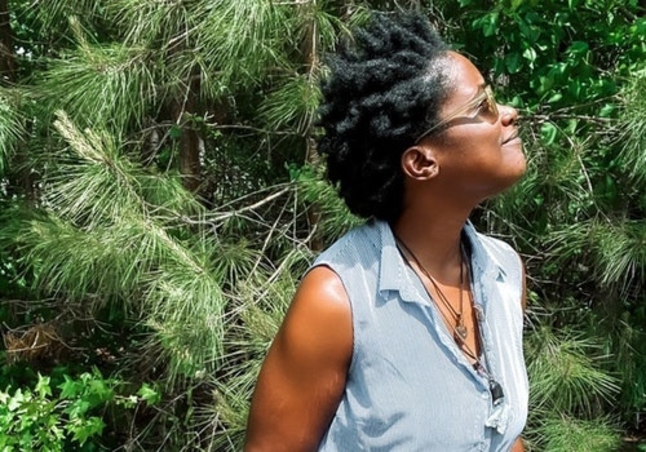Tell us a little about your poetry collection!
Thresh & Hold is concerned with healing, spirituality, and ancestry. I moved back home to Heirs Property just before the pandemic began. While working with a healer, I found myself paying more attention to the rocking chairs, red bricks, and the dirt on the land where my family has lived for centuries. I began to follow the horned owls and spend time with pictures of dead relatives I’d never met, writing letters to them and letting them write back. It turns out the land, the water, and the stories within and all around my family history, including Gullah-Geechee culture, had been calling to me. I grew up visiting local plantations and museums on school field trips, receiving flat narratives about the West & Central Africans who were enslaved here. These poems are obsessed with what I was obsessed with as a child: How did I/we get here? Who are these people? Where do we go when we die? How do we feel better? I think these poems ask vulnerable questions and wonder, and I hope these poems boldly imagine and remake.
Who/what have you been reading recently? What inspires you?
I enjoy reading multiple books at once. Most recently, I have been reading H. Melt’s Trans People Are Here, Inger Christenson’s The Condition of Secrecy, Tara Betts’ Break the Habit and Arc & Hue, Matthew Olzmann’s Mezzanines and Contradictions in the Design, bell hooks’ All About Love, Raymond Antrobus’ All the Names Given, and Patrick Rosal’s Uprock Headspin Scramble and Dive. I’ve been re-reading Hafizah Geter’s Un-American, Destiny Hemphill’s Oracle: A Cosmology, Tyree Daye’s Cardinal, Ariel Francisco’s A Sinking Ship Is Still A Ship, Tiana Nobile’s Cleave, and Ashley M. Jones’ Reparations Now.
I am inspired by craft talks, interviews, and workshops with artists and healers across disciplines. I also enjoy meeting new artists and listening to them share about their creative being and their work. I am drawn to writers from other countries and other realms. I am often inspired by dead writers and I enjoy following questions I don’t think anyone alive can answer.
How does the South/place in general inform your writing?
It wasn't until I left the South that I could write about what it meant, for me, to be from the South as a Black American, queer, and non-binary person. South Carolina is my origin point. It is an origin point for several generations of my ancestry. I am fascinated by walking where my direct ancestors walked. The South, for me, is simply a portal through which I work to unlearn oppression, rework imbalanced power dynamics within myself and around me, and it is where I have the opportunity to heal. The more healing work I do, the more I am able to notice what is happening within and all around me. I think, too, about the Global South. I consider man-made boundaries and how my work upholds or upends false and oppressive ideas of separation. I’ve been sitting with two questions: “Does it matter that I’m from the South? Who made this up?”
What would you say is an interesting writing quirk that you have?
I record myself speaking into my phone’s voice recorder and I forget the recordings are there. When I’m having a bad writing day or feeling like I haven’t made anything, I go to my voice recorder and find everything my brain and heart have been working through. I usually laugh aloud while listening because I don’t recall recording any of it. I often start many poems from these streams of consciousness, images, or sounds.
What do you do when you aren't writing?
When I’m not writing, I am meditating, doing qi-gong, reading, gardening, visiting with family members, feeling my feelings, dancing, streaming something, walking my dog, talking to a friend, doing other work, or interacting with an arts administrator from somewhere.
What is something you learned while writing this poetry collection?
It is okay that I don’t have many answers and I never will. This one still gets me!
There is more to my existence than explaining it as a Black person or a queer person or a non-binary person. Writing this book has deeply changed me. I learned that when I am not writing for the purpose of changing someone else, I give myself the opportunity to be transformed. It’s okay for people to hate my work as much as it is for others to enjoy it. I learned I’m okay and I am supported. I’m okay.


